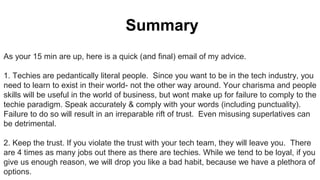Networking Final 490R
- 1. My name is Mike Norton. This is me and my story...
- 4. As your 15 min are up, here is a quick (and final) email of my advice. Firstly, techies are pedantically literal people. Since you want to be in the tech industry, you need to learn to exist in their world- not the other way around. Your charisma and people skills will be useful in the world of business, but wont make up for failure to comply to the techie paradigm. Speak accurately & comply with your words (including punctuality). Failure to do so will result in an irreparable rift of trust. Even misusing superlatives can be detrimental. Ok, onto the technical portion. As I don't know how you are attempting to do what you are trying to do, this will be generic advice (but still highly valuable). The number one problem with tech-entrepreneurship is focus. While you can decisively switch from 1 focus to another, bouncing around between foci, or attempting to focus on various aspects will lead to failure. Decide what the core of your product is, and make it. Then, and only then, can you expand it. Keep the trust. If you violate the trust with your tech team, they will leave you. There are 4 times as many jobs out there as there are techies. While we tend to be loyal, if you give us enough reason, we will drop you like a bad habit, because we have a plethora of options. Use bug tracking software & keep each issue focused. Email will drain the life out of your developers. It is an ambiguous form of communication that usually spews forth unfiltered. There are dozens of bug tracking systems. Having discrete and cohesive tickets will allow your techies to complete tasks in the order prioritized and make progress. Don't abuse the "top prioritization" either. It should be rare, and truly focused on the most core needs. Keep tickets small too. If it can't be done in less than a week, break it into sub-tasks. Most tasks should be able to be accomplished in less than a day (apart from research tasks). Use a code repository. Git is the easiest to set up and can be free (and includes free bug tracking). It doesn't matter which repo you use, but it's vital you have one. It prevents code loss, which often happens with machine failures or personnel changes. It also serves as excellent documentation for progress, and can be invaluable in a patent or IP dispute. Have a test environment that reflects your live environment. A stage environment (one that the whole team uses before making changes to the live one) is also useful, but a test environment is a must. It should reflect the live environment in every way possible. This is true for mobile devices as well as servers (including your site). You shouldn't be shooting from the hip and making changes to your live site. That's a great way for customers (or potential customers) to see errors on your live site and lose trust in your company. Before I leave, I must censure you for your behavior toward me. While things wont always work as planned, you should always let people know. You have my email as well as my cell. Leaving me hanging is inexcusable. If you did anything like this to an investor, or to one of your techies, you are risking failure. While I require no apology, I am merely unwilling to do you a favor now (I am a busy man, and will not reply to any email you send- so I truly do not wish an apology, as it would just be a waste of your time). That's the way life works. There is a surprising amount of wiggle room and forgiveness if you let people know beforehand, and surprisingly little after the fact. I wish you luck on your efforts, and hope my generic advice saves you headaches that many start-ups go through. I want to re-emphasize that I've given this advice to many start-ups, and many have ignored it. All those that have ignored bug tracking, code repos, and test environments have suffered greatly because of it. If you take 1 thing away from this encounter, I hope it's that those 3 things are non-negotiable: you must have them to succeed.
- 5. As your 15 min are up, here is a quick (and final) email of my advice. 1. Techies are pedantically literal people. Since you want to be in the tech industry, you need to learn to exist in their world- not the other way around. Your charisma and people skills will be useful in the world of business, but wont make up for failure to comply to the techie paradigm. Speak accurately & comply with your words (including punctuality). Failure to do so will result in an irreparable rift of trust. Even misusing superlatives can be detrimental. 2. Keep the trust. If you violate the trust with your tech team, they will leave you. There are 4 times as many jobs out there as there are techies. While we tend to be loyal, if you give us enough reason, we will drop you like a bad habit, because we have a plethora of options. Summary
- 6. Before I leave, I must censure you for your behavior toward me. While things wont always work as planned, you should always let people know. You have my email as well as my cell. Leaving me hanging is inexcusable. If you did anything like this to an investor, or to one of your techies, you are risking failure. While I require no apology, I am merely unwilling to do you a favor now (I am a busy man, and will not reply to any email you send- so I truly do not wish an apology, as it would just be a waste of your time). That's the way life works. There is a surprising amount of wiggle room and forgiveness if you let people know beforehand, and surprisingly little after the fact. Continued...
- 10. 3 Things - Be Interested - Be interesting - Be involved


















